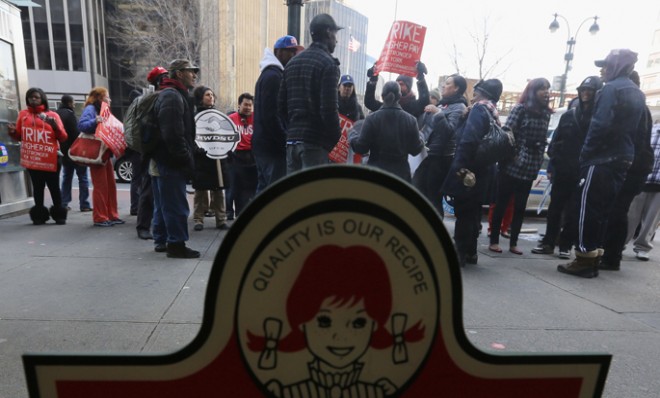New York's historic fast-food strike
Workers are demanding better wages and the right to unionize — but they face an uphill battle


A free daily email with the biggest news stories of the day – and the best features from TheWeek.com
You are now subscribed
Your newsletter sign-up was successful
About 400 workers at 70 New York City fast-food restaurants walked off the job on Thursday, in what could be the industry's largest strike in history. It's part of an ongoing push to win higher wages and the right to unionize for the city's 50,000-plus fast-food cashiers and burger flippers.
New York Communities for Change, the group spearheading the "Fast Food Forward" campaign, picked the date, April 4, because it is the anniversary of Martin Luther King's assassination in 1968, which occurred during a visit to Memphis in support of striking sanitation workers.
Thursday's strike was the second for New York's fast-food workers, after many walked off the job for a day in November. And the latest "strike is unlikely to be the last," says Ned Resnikoff at MSNBC, though "there are significant hurdles to overcome." A big one is the declining strength of unions, which is going to make the effort to organize workers "even more of an uphill climb," says Resnikoff.
The Week
Escape your echo chamber. Get the facts behind the news, plus analysis from multiple perspectives.

Sign up for The Week's Free Newsletters
From our morning news briefing to a weekly Good News Newsletter, get the best of The Week delivered directly to your inbox.
From our morning news briefing to a weekly Good News Newsletter, get the best of The Week delivered directly to your inbox.
In fact, workers behind the counters of fast-food restaurants are facing "a climate that is, in some ways, pre-1968 with regards to worker rights," Michael K. Honey, a civil rights historian, tells MSNBC. A spokesperson for Burger King, one of the chains affected, said the criticism was off the mark, since the company provides millions of entry-level jobs and pays competitively. McDonald's said its policy is that all of its employees "deserve to be treated with dignity."
There's certainly a lot at stake. "Fast food is becoming an ever-larger and more representative sector of the U.S. economy," says Josh Eidelson at Salon. And people employed in the industry have plenty of gripes, including low wages, paltry or non-existent benefits, and erratic schedules. "These are the quintessential example of the kinds of jobs that we have now," Columbia University political scientist Dorian Warren tells Salon, "and of the kind of job that we can expect in the future for the next few decades."
A central demand is to make a living wage. The workers are asking for $15 an hour, up from the minimum wage of $7.25 an hour. "Even $9 an hour, the [minimum wage] target that President Obama named and that New York will hit in three years, isn't enough to live on in New York City," says Sarah Jaffe at The Atlantic. "According to a 2010 report prepared by the Women's Center for Education and Career Advancement, the 'self-sufficiency standard' — how much it costs to live without relying on government subsidies — for a single adult living in the Bronx (the cheapest borough) was $12.56 an hour; for an adult with one child, that number jumps to $23.39 an hour."
And, says Jaffe, compounding the problem is the fact that "wages have been trending downward" across the U.S. since the Great Recession hit. "It's almost like we are coming to the rock bottom of how low wages can actually get in this country, how terrible the working conditions can be for folks," Jonathan Westin, executive director of NYCC, tells The Atlantic. "The only place to go is to claw our way back up."
A free daily email with the biggest news stories of the day – and the best features from TheWeek.com
Harold Maass is a contributing editor at The Week. He has been writing for The Week since the 2001 debut of the U.S. print edition and served as editor of TheWeek.com when it launched in 2008. Harold started his career as a newspaper reporter in South Florida and Haiti. He has previously worked for a variety of news outlets, including The Miami Herald, ABC News and Fox News, and for several years wrote a daily roundup of financial news for The Week and Yahoo Finance.
-
 One great cookbook: Joshua McFadden’s ‘Six Seasons of Pasta’
One great cookbook: Joshua McFadden’s ‘Six Seasons of Pasta’the week recommends The pasta you know and love. But ever so much better.
-
 Scientists are worried about amoebas
Scientists are worried about amoebasUnder the radar Small and very mighty
-
 Buddhist monks’ US walk for peace
Buddhist monks’ US walk for peaceUnder the Radar Crowds have turned out on the roads from California to Washington and ‘millions are finding hope in their journey’
